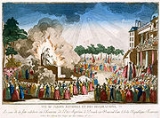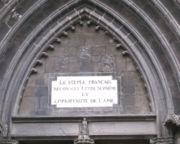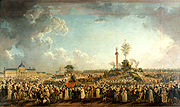
Cult of the Supreme Being
Encyclopedia
The Cult of the Supreme Being was a form of deism
established in France by Maximilien Robespierre
during the French Revolution
. It was intended to become the state religion
of the new French Republic.
. The first major organized school of thought emerged under the umbrella name of the Cult of Reason
. Advocated by extreme radicals like Jacques Hébert
and Antoine-François Momoro
, the Cult of Reason distilled a mixture of largely atheistic
views into a humanocentric
philosophy. No gods at all were worshiped in the Cult – the guiding principle was devotion to the abstract conception of Reason
.
This bold rejection of all divinity appalled the rectitudinous Robespierre. Its offense was compounded by the "scandalous scenes" and "wild masquerades" attributed to its practice. In late 1793, Robespierre delivered a fiery denunciation of the Cult and its proponents and proceeded to give his own vision of proper Revolutionary religion. Devised almost entirely by his own hand, Le culte de l'Être suprême was formally announced before the French National Convention
on 7 May 1794.

. He sought to move beyond simple deism (often described as Voltaire
an by its adherents) to a new and, in his view, more rational devotion to the godhead
. The primary principles of the Cult of the Supreme Being were a belief in the existence of a god and the immortality of the human soul
. Though not inconsistent with Christian doctrine, these beliefs were put to the service of Robespierre's fuller meaning, which was of a type of civic-minded, public virtue he attributed to the Greeks and Romans. This type of Virtue could only be attained through active fidelity to liberty
and democracy. Belief in a living god and a higher moral code, he said, were "constant reminders of justice" and thus essential to a republican society.
process that had been looked upon previously with official favor.
Simultaneously it marked the apogee of Robespierre's power. Though in theory he was just an equal member of the Committee of Public Safety
, Robespierre at this point possessed a national prominence bordering on the imperial.
 To inaugurate the new state religion, Robespierre declared that 20 Prairial Year II (8 June 1794) would be the first day of national celebration of the Supreme Being, and future republican holidays were to be held every tenth day – the days of rest (décadi) in the new French Republican Calendar
To inaugurate the new state religion, Robespierre declared that 20 Prairial Year II (8 June 1794) would be the first day of national celebration of the Supreme Being, and future republican holidays were to be held every tenth day – the days of rest (décadi) in the new French Republican Calendar
. Every locality was mandated to hold a commemorative event, but the event in Paris was designed on a massive scale. The festival was organized by the artist Jacques-Louis David
and took place around a man-made mountain on the Champ de Mars. Robespierre assumed full leadership of the event, forcefully – and, to many, ostentatiously – declaring the truth and "social utility" of his new religion.
and the downfall of Robespierre. With his death at the guillotine
on 28 July 1794, the cult lost all official sanction and disappeared from public view. It was officially banned by Napoleon Bonaparte
with his Law on Cults of 18 Germinal, Year X.
Deism
Deism in religious philosophy is the belief that reason and observation of the natural world, without the need for organized religion, can determine that the universe is the product of an all-powerful creator. According to deists, the creator does not intervene in human affairs or suspend the...
established in France by Maximilien Robespierre
Maximilien Robespierre
Maximilien François Marie Isidore de Robespierre is one of the best-known and most influential figures of the French Revolution. He largely dominated the Committee of Public Safety and was instrumental in the period of the Revolution commonly known as the Reign of Terror, which ended with his...
during the French Revolution
French Revolution
The French Revolution , sometimes distinguished as the 'Great French Revolution' , was a period of radical social and political upheaval in France and Europe. The absolute monarchy that had ruled France for centuries collapsed in three years...
. It was intended to become the state religion
State religion
A state religion is a religious body or creed officially endorsed by the state...
of the new French Republic.
Origins
The French Revolution had given birth to many radical changes in France, but one of the most fundamental for the hitherto Catholic nation was the official rejection of religionState atheism
State atheism is the official "promotion of atheism" by a government, sometimes combined with active suppression of religious freedom and practice...
. The first major organized school of thought emerged under the umbrella name of the Cult of Reason
Cult of Reason
The Cult of Reason was an atheistic belief system established in France and intended as a replacement for Christianity during the French Revolution.-Origins:...
. Advocated by extreme radicals like Jacques Hébert
Jacques Hébert
Jacques René Hébert was a French journalist, and the founder and editor of the extreme radical newspaper Le Père Duchesne during the French Revolution...
and Antoine-François Momoro
Antoine-François Momoro
Antoine-François Momoro was a French printer, bookseller and politician during the French Revolution. An important figure in the Cordeliers club and in Hébertisme, he is the originator of the phrase Liberté, Égalité, Fraternité, the motto of the French Republic.-Life:-"First Printer of...
, the Cult of Reason distilled a mixture of largely atheistic
Atheism
Atheism is, in a broad sense, the rejection of belief in the existence of deities. In a narrower sense, atheism is specifically the position that there are no deities...
views into a humanocentric
Anthropocentrism
Anthropocentrism describes the tendency for human beings to regard themselves as the central and most significant entities in the universe, or the assessment of reality through an exclusively human perspective....
philosophy. No gods at all were worshiped in the Cult – the guiding principle was devotion to the abstract conception of Reason
Reason
Reason is a term that refers to the capacity human beings have to make sense of things, to establish and verify facts, and to change or justify practices, institutions, and beliefs. It is closely associated with such characteristically human activities as philosophy, science, language, ...
.
This bold rejection of all divinity appalled the rectitudinous Robespierre. Its offense was compounded by the "scandalous scenes" and "wild masquerades" attributed to its practice. In late 1793, Robespierre delivered a fiery denunciation of the Cult and its proponents and proceeded to give his own vision of proper Revolutionary religion. Devised almost entirely by his own hand, Le culte de l'Être suprême was formally announced before the French National Convention
National Convention
During the French Revolution, the National Convention or Convention, in France, comprised the constitutional and legislative assembly which sat from 20 September 1792 to 26 October 1795 . It held executive power in France during the first years of the French First Republic...
on 7 May 1794.

Religious tenets
Robespierre believed that reason is only a means to an end, and the singular end is VirtueVirtue
Virtue is moral excellence. A virtue is a positive trait or quality subjectively deemed to be morally excellent and thus is valued as a foundation of principle and good moral being....
. He sought to move beyond simple deism (often described as Voltaire
Voltaire
François-Marie Arouet , better known by the pen name Voltaire , was a French Enlightenment writer, historian and philosopher famous for his wit and for his advocacy of civil liberties, including freedom of religion, free trade and separation of church and state...
an by its adherents) to a new and, in his view, more rational devotion to the godhead
Godhead
Godhead , may refer to:*Deity*Divinity, the quality of being God*Conceptions of God*Godhead , the totality of gods, in Platonism the Transcendent One....
. The primary principles of the Cult of the Supreme Being were a belief in the existence of a god and the immortality of the human soul
Soul
A soul in certain spiritual, philosophical, and psychological traditions is the incorporeal essence of a person or living thing or object. Many philosophical and spiritual systems teach that humans have souls, and others teach that all living things and even inanimate objects have souls. The...
. Though not inconsistent with Christian doctrine, these beliefs were put to the service of Robespierre's fuller meaning, which was of a type of civic-minded, public virtue he attributed to the Greeks and Romans. This type of Virtue could only be attained through active fidelity to liberty
Liberty
Liberty is a moral and political principle, or Right, that identifies the condition in which human beings are able to govern themselves, to behave according to their own free will, and take responsibility for their actions...
and democracy. Belief in a living god and a higher moral code, he said, were "constant reminders of justice" and thus essential to a republican society.
Revolutionary impact
Robespierre used the religious issue to publicly denounce the motives of many radicals not in his camp, and it led, directly or indirectly, to the executions of Revolutionary de-Christianisers like Hébert, Momoro, and Anacharsis Cloots. The establishment of the Cult of the Supreme Being represented the beginning of the reversal of the wholesale de-ChristianisationDechristianisation of France during the French Revolution
The dechristianisation of France during the French Revolution is a conventional description of the results of a number of separate policies, conducted by various governments of France between the start of the French Revolution in 1789 and the Concordat of 1801, forming the basis of the later and...
process that had been looked upon previously with official favor.
Simultaneously it marked the apogee of Robespierre's power. Though in theory he was just an equal member of the Committee of Public Safety
Committee of Public Safety
The Committee of Public Safety , created in April 1793 by the National Convention and then restructured in July 1793, formed the de facto executive government in France during the Reign of Terror , a stage of the French Revolution...
, Robespierre at this point possessed a national prominence bordering on the imperial.
Festival of the Supreme Being

French Republican Calendar
The French Republican Calendar or French Revolutionary Calendar was a calendar created and implemented during the French Revolution, and used by the French government for about 12 years from late 1793 to 1805, and for 18 days by the Paris Commune in 1871...
. Every locality was mandated to hold a commemorative event, but the event in Paris was designed on a massive scale. The festival was organized by the artist Jacques-Louis David
Jacques-Louis David
Jacques-Louis David was an influential French painter in the Neoclassical style, considered to be the preeminent painter of the era...
and took place around a man-made mountain on the Champ de Mars. Robespierre assumed full leadership of the event, forcefully – and, to many, ostentatiously – declaring the truth and "social utility" of his new religion.
Legacy
The Cult of the Supreme Being and its much-derided festival can be said to have contributed to the Thermidorian reactionThermidorian Reaction
The Thermidorian Reaction was a revolt in the French Revolution against the excesses of the Reign of Terror. It was triggered by a vote of the Committee of Public Safety to execute Maximilien Robespierre, Antoine Louis Léon de Saint-Just de Richebourg and several other leading members of the Terror...
and the downfall of Robespierre. With his death at the guillotine
Guillotine
The guillotine is a device used for carrying out :executions by decapitation. It consists of a tall upright frame from which an angled blade is suspended. This blade is raised with a rope and then allowed to drop, severing the head from the body...
on 28 July 1794, the cult lost all official sanction and disappeared from public view. It was officially banned by Napoleon Bonaparte
Napoleon I
Napoleon Bonaparte was a French military and political leader during the latter stages of the French Revolution.As Napoleon I, he was Emperor of the French from 1804 to 1815...
with his Law on Cults of 18 Germinal, Year X.
See also
- Cult of ReasonCult of ReasonThe Cult of Reason was an atheistic belief system established in France and intended as a replacement for Christianity during the French Revolution.-Origins:...
- Reign of TerrorReign of TerrorThe Reign of Terror , also known simply as The Terror , was a period of violence that occurred after the onset of the French Revolution, incited by conflict between rival political factions, the Girondins and the Jacobins, and marked by mass executions of "enemies of...
- Dechristianisation of France during the French RevolutionDechristianisation of France during the French RevolutionThe dechristianisation of France during the French Revolution is a conventional description of the results of a number of separate policies, conducted by various governments of France between the start of the French Revolution in 1789 and the Concordat of 1801, forming the basis of the later and...
Further reading
- http://books.google.com/books?id=lWAFaAEACAAJ&dq=Rousseau's+religious+ideas+with+reference+to+the+religious+ideas+prominent+in+the+revolution+and+to+their+influence+on+Robespierre+and+Saint+Just&hl=en&ei=m_1GTteDG-rk0QHom7XlBw&sa=X&oi=book_result&ct=result&resnum=1&ved=0CCoQ6AEwAARousseau's religious ideas with reference to the religious ideas prominent in the revolution and to their influence on Robespierre and Saint Just], doctoral thesis by Elma Gillespie Martin (1918, Cornell UniversityCornell UniversityCornell University is an Ivy League university located in Ithaca, New York, United States. It is a private land-grant university, receiving annual funding from the State of New York for certain educational missions...
)
External links
- The Supreme Being, by Maximilien Robespierre. Source: Internet Modern History Sourcebook, Fordham University, NY.
- Decree on Worship of the Supreme Being Source: Church and state in the modern age: a documentary history; J. F. Maclear, ed.; Oxford Univ. Press, 1999.

